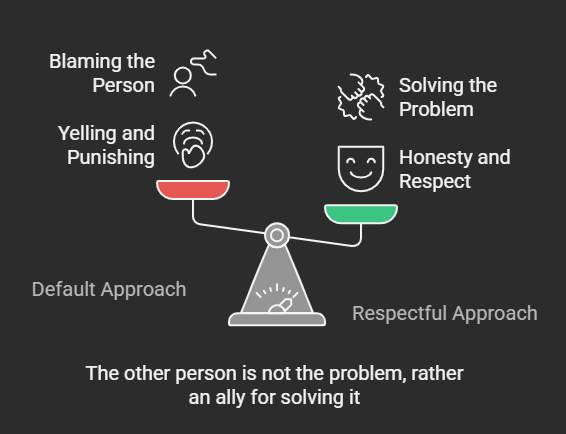How (not) to Handle a Conflict
We want our relationships to be smooth, pleasurable experiences.
We hope that each will reach a level of synergy and understanding that goes beyond words.
Yet, as with all relationships, conflicts will happen. Your boss is angry about missing a deadline, your kid doesn't listen to you (for the thousandth time), your friends say something hurtful, and you're fighting with your partner (again) over some house chores.
Conflicts are unavoidable, the question is how to approach them.
The unfortunate default response is to be filled with anger, disappointment and resentment. We feel as if we "can't help it", as if it's our body's automated response. Through red colored glasses, we see the conflict through the "blame game" eyes.
We say things like "why did you do this to me?", "why do you always do x on purpose?", "how can you be so inconsiderate?".
When we are on the yelled side, we get defensive, we shift the blame back to the other person, we rebel against their wishes, we yell, we quit, we hide, whatever's necessary to protect ourselves. After all, how can we accept being treated that way? Once the fight begins, it's no longer admitting to making a mistake, rather that we are a bad or stupid person (or both).
The blame game only ends in one way, the worst way. It turns disagreement into conflict, it escalates, it hurts, and it fails to solve the problem that caused it.
We need to handle conflicts better, or more correctly, not treat them as conflict in the first place.
From Conflict to Cooperation
A disagreement becomes a conflict once we see the other person as the problem, instead of the problem as the problem. If our kids doesn't listen to us, it's because they are lazy, inconsiderate, or selfish.
We attach the problem to their identity, which means the only way the problem will be solved is if they change who they are.
Instead, we should see the problem as the problem. What caused the event? Why is there a miscommunication? Perhaps they don't understand what you're asking, perhaps they want to do it yet fail because of distractions or forgetfulness, perhaps they were having a really bad day so your request should be the last thing on their mind.
Remember that most likely, people are not "out to get you", they hardly do things intentionally to hurt you, even if it seems that way.
When we shift the perspective from "they are the problem", to "there's a problem", a whole new range of options opens up that gives a much healthier view on the situation.
When the other person is not the problem, you turn them from an enemy to an ally.
Allies can use their collective intelligence, motivation and energy to solve a shared problem. Being enemies usually only makes the situation worse. It's a huge difference when the "other side" works with you, not against you, offering solutions that you might not have thought about.
For example, a criticizing boss doesn't mean they are a disagreeable person, rather it's a shared communication problem. Having a sync at the start of a project instead of at the end will make sure the plan works for both sides, preventing the criticism in advance, without targeting someone as problematic
Actionable Tips: How to Turn Conflict Into Collaboration
- Pause before reacting – Take a breath before assuming the worst.
- Describe the problem – Instead of blaming, describe the problem objectively, as something you both face together.
- Use “I” statements – Say how the situation affects you rather than accusing. Like "I feel that..." instead of "you always..."
- Seek their input – Ask them how they view the situation, and which solutions they can offer.
- Look for common ground – Focus on shared interests, not differences.
Ask Yourself
- How do I typically react to conflict?
- Have I ever assumed bad intent when there was none?
- How can I better separate the person from their behavior?
Conclusion
A disagreement is nothing more than a shared problem, one that we can work together to solve. Turning it into a blame game makes it a conflict, where both sides get hurts and the problem remains unsolved. Remember - the problem is the problem, not the person.
